新概念英语1-Lesson19-20
新概念英语1__19-20课
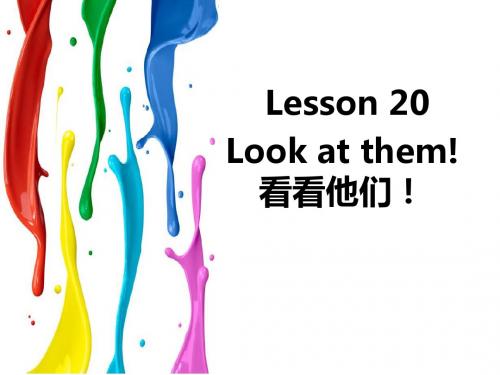
No, it isn’t. Is the car silver or black?
It is silver.
the car/silver/black
选择疑问句
用第20课的图片仿照例句看图说话。
任务二:复习选择疑问句
Is Lily thirsty or hungry? She is thirsty.
Lily/thirsty/hungry
任务二:复习选择疑问句
Is Tom cold or hot? He is cold.
Tom/cold/hot
任务二:复习选择疑问句
Is the box heavy or light? It is heavy.
box/heavy/light
任务二:复习选择疑问句
hot
肥胖的
大的
fat
big open light old short
打开的
轻的
老的;旧的
矮的;短的
三. New words:脏的
dirty
冷的
瘦的
cold
thin
小的
关闭的
small
shut heavy young new tall long重的年轻的 Nhomakorabea新的
高的 长的
Match them: clean hot cold thin
练习
• P40 – 练习2:造句 例句:
his shoes / (dirty) / clean • Are his shoes dirty or clean? • They’re not dirty. • They’re clean.
Homework!
• Recite the words . • Listen to the tape and repeat! • Do the exercises of Lesson 20.
新概念课堂笔记第一册Lesson19-20
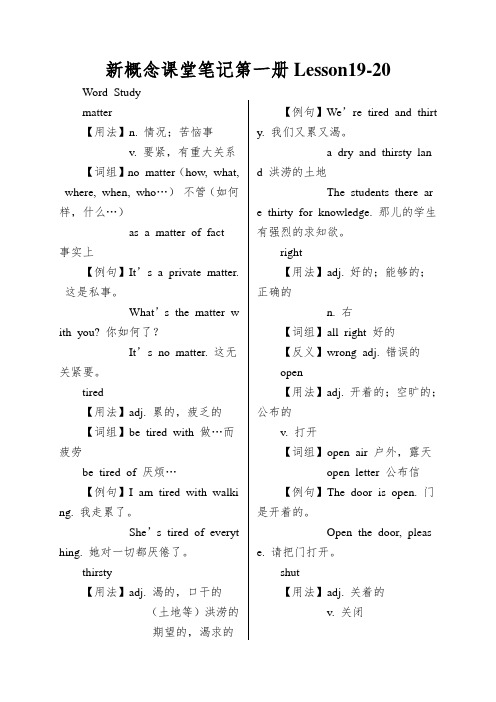
新概念课堂笔记第一册Lesson19-20 Word Studymatter【用法】n. 情况;苦恼事v. 要紧,有重大关系【词组】no matter(how, what, where, when, who…)不管(如何样,什么…)as a matter of fact 事实上【例句】It’s a private matter.这是私事。
What’s the matter w ith you? 你如何了?It’s no matter. 这无关紧要。
tired【用法】adj. 累的,疲乏的【词组】be tired with 做…而疲劳be tired of 厌烦…【例句】I am tired with walki ng. 我走累了。
She’s tired of everyt hing. 她对一切都厌倦了。
thirsty【用法】adj. 渴的,口干的(土地等)洪涝的期望的,渴求的【例句】We’re tired and thirt y. 我们又累又渴。
a dry and thirsty lan d 洪涝的土地The students there ar e thirty for knowledge. 那儿的学生有强烈的求知欲。
right【用法】adj. 好的;能够的;正确的n. 右【词组】all right 好的【反义】wrong adj. 错误的open【用法】adj. 开着的;空旷的;公布的v. 打开【词组】open air 户外,露天open letter 公布信【例句】The door is open. 门是开着的。
Open the door, pleas e. 请把门打开。
shut【用法】adj. 关着的v. 关闭【词组】shut off关掉,切断(电源)停止供应(煤气,水等)【例句】The window is shut. 窗户是关着的。
Shut the window, ple ase. 请关上窗户。
新概念英语一 Lesson19-20 语法讲解:名词单复数变形
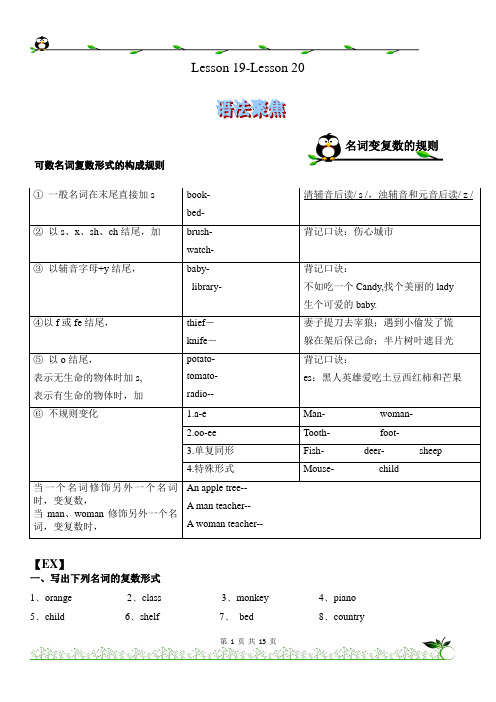
Lesson 19-Lesson 20名词变复数的规则可数名词复数形式的构成规则【EX 】一、写出下列名词的复数形式1、orange_________2、class _________3、monkey_________4、piano________5、child _________6、shelf __________7、 bed_________8、country_______① 一般名词在末尾直接加s book- bed-清辅音后读/ s /,浊辅音和元音后读/ z /② 以s 、x 、sh 、ch 结尾,加 brush- watch-背记口诀:伤心城市③ 以辅音字母+y 结尾, baby- library-背记口诀:不如吃一个Candy,找个美丽的lady 生个可爱的baby.④以f 或fe 结尾, thief - knife -妻子提刀去宰狼;遇到小偷发了慌 躲在架后保己命;半片树叶遮目光 ⑤ 以o 结尾,表示无生命的物体时加s, 表示有生命的物体时,加 potato- tomato- radio-- 背记口诀:es :黑人英雄爱吃土豆西红柿和芒果⑥ 不规则变化1.a-e Man- woman-2.oo-ee Tooth- foot-3.单复同形 Fish- deer- sheep4.特殊形式Mouse- child当一个名词修饰另外一个名词时,变复数,______________当man 、woman 修饰另外一个名词,变复数时,____________An apple tree-- A man teacher--A woman teacher--9、family_________ 10、toy________ 11、 foot __________ 12、radio________ 13、photo________ 14、tomato_________ 15、woman________ 16、knife______ 17、sheep________ 18、ship________ 19、dish_________ 20、mouse__________ 21、tooth ________ 22、leaf _________二、用所给的单词的复数的正确形式填空:1. There are two (child) in the room.2. I have two new (dress).3. Do you have any (sister) and (brother)?4. They are from America.5. There are two (policewoman) in the street.6. Some (people) are at the cinema.7. These (housewife) are very hard-working.三.改正下列句子中的错误。
新概念英语第一册第十九课.二十课PPT
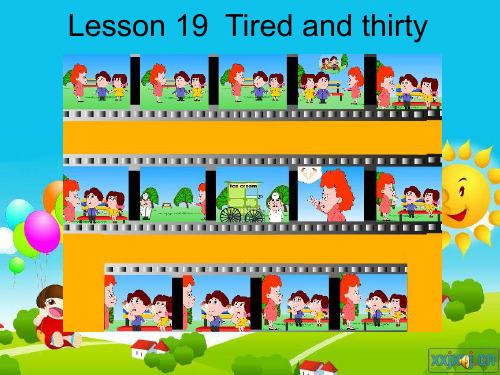
New Words
matter [‘mætə] n. 事件,物质,原因 What’s the matter (with you)? =What’s wrong? children [‘tʃildrən] n.孩子们 children = child + ren Children’s Day child [tʃaild] n. 小孩
• They’re not young. • They’re old.
• 8.their hats /(old)/new
• Are their hats old or new?
• They’re not old. • They’re new.
• 9.the policemen /(short)/tall
---------children
---------feet ---------teeth
• 例如: • his shoes /(dirty) /clean • Are his shoes dirty or clean? • They’re not dirty. • They’re clean.
• 1.the children /(tired) /thirsty
Key structures
1. What‘s the matter?怎么啦? 相当于 What's wrong? 2. … and … 又…又… tired and thirty 又累又渴 He is fat and short! 3. There’s an ice cream man. =There is There is a boy. There are two girls. 4. Two ice creams please.请拿两份冰淇淋。
新概念英语笔记

新概念英语笔记Lesson 1--- lesson 101、Excuse me 打扰一下 =do not punish sb =let sb off(放某人一马)。
2、他非常感谢我 He thanks me very much.(very much 修动词)= He gives me so thanks.(so thanks 连用)3、book:书n 预订v4、watch :n 手表 v 观看,注视5、dress:n 连衣裙 v化妆be dressed in = wear=have on 今天她穿了一件新裙子。
Today she is dressed in a new skirt.Today she wears a new skirt.Today she has on a new skirt.6、Is this your handbag?=Is this handbag yours.7、pardon = I beg your pardon?请再说一遍。
8、你是多少号?①What,s your number? =②What,s the number of you?= ③what number are you?9、他是我们的英语老师。
He is our English teacher.=He teaches us English.=we learn English from him.10、Here is my ticker(倒装) 正常句式:My ticket is here.11、here is …..强调地点this is ….(指示)12、This is not my umbrella =This umbrella is not mine.13、I thing …. 我认为….(后接从句)你认为怎么样? What dou you think of sth/ doing sth14 、Where is she ? Do you know?合一句为:Do you know where she is ?(Do you know+特殊疑问词+陈述语序)15、练习:She is twelve. How old is she ?=What is her age?She is in Class Four Grade One . what class is she in? She is Number Two. ①What number is she ?= ②what is her bumber?=③What,s the number of her?16、good adi;好的; n goods 货物货品比较级:better 最高级the best 副词: wellbe good at 擅长接名词(sth)或动名词(doing sth)17、中国China 中国人,中国的,语文 Chinese日本 Japan 日本人日本的日语 Japanese法国France 法国人法国的法语 French德国Germany 德国人德国的德语 German韩国 Korea 韩国人韩国的韩语 Korean丹麦丹麦人西班牙西班牙语俄罗斯 Russia 俄罗斯人 Russian荷兰 Holland 荷兰人 Dutch18、make sb do sth 让某人做某事(相当于Let)Make up 化妆 make up for 弥补…过失下定决心,拿定主意 make up one,s mind它是什么牌子的. What make is it ?19、她是法国人。
新概念英语第一册Lesson1920Tiredandthirsty小学英语初中英语全国通用
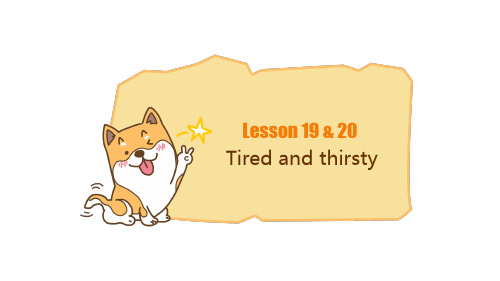
open
Vocabulary
词汇精讲
old young new
old : (1) 老的 , 年老的 , 上了年纪的
↔ young : 年轻的
e.g. young man : 年轻人
old man : 老人 /爸爸
B. What's wrong?
C. How is everything?
D. What's up?
查看答案解析
答案:How is everything 解析: 考查曰常用语 How is everything? 一切都还好吧?近况如何?
下一题
There are five ________ (child) in the classroom.
Language Point
语句讲解、课文讲解
同学们 , 请对照教材听老师讲解!
肯定 : Yes, we are. / Yes, I am. —Are you all right? 你们还好吗?/你没事吧? —I'm all right. / We're all right. → 类似于I'm fine. / We're fine.
词汇精讲
small
—Look at this apple! Is this apple big?
—No, it isn't It's small.
light
—Look at these cases. Are they heavy?
—No, they're not heavy. They're light.
新概念英语第一册Lesson19-20 Tired and thirsty

• I have a watch. 我有一块手表。(表示拥有)
practice
1.There _____ a clock on the table.
a. is
b. are
2.______ there a radio on your desk?
practice
• 请你变换刚才的三个句型,分别改成一般 疑问句以及否定句。
• There is a tie in the box. • There are two shirts on the bed. • There is some water on the desk.
Key point
• 1.不管作主语的名词有多少个,be动词的数只与第一个 名词保持一致。这就是传说中的就近原则。
Mother: Here you are, children. Children: Thanks, Mum.
Here you are.给你 Here they are/Here it is.
Girl: These ice creams are nice.
these 这些
those 那些
this 这个
What’s the matter (with … )? = What’s wrong (with …)? …怎么了?
child [tʃaild] n. 孩子(单数) children [‘tʃildrən] n. 孩子们(复数)
一般疑问句:Are you tired and thirsty?
Mother: Sit down here.
三.连词成句 1. matter, is, the, what
新概念英语第一册-第19-20课资料

Lesson 20 Look at them!
Lesson 20 Look at them!
• New word and expressions • 1 big [big] a.大的 • 2 small [smɔ:l] a.小的 • 3 open ['əupən] a.开着的 • 4 shut [ʃʌt] a.关着的 closed • 5 light [lait] a.轻的
Mother: What's the matter, children? Girl: We're tired … Boy: … and thirsty, Mum.
Mother: Sit down here. Mother: Are you all right now?
Boy: No, we aren't. Mother: Look! There’s an ice cream man.
sit down [´sɪt-daʊn] 坐下
right [raɪt]
adj.好,可以
ice cream [´aɪs- ´kri:m] 冰淇淋
matter
children
thirsty
sit down
ice cream
right tired
Listen!
1、What's the matter with children? 2、What does their mother buy? 3、Why do the children thank mother?
Here you are.给你
Girl: These ice creams are nice.
•these 这些 those 那些
•this 这个
(完整word版)新概念英语第一册课文下载word版
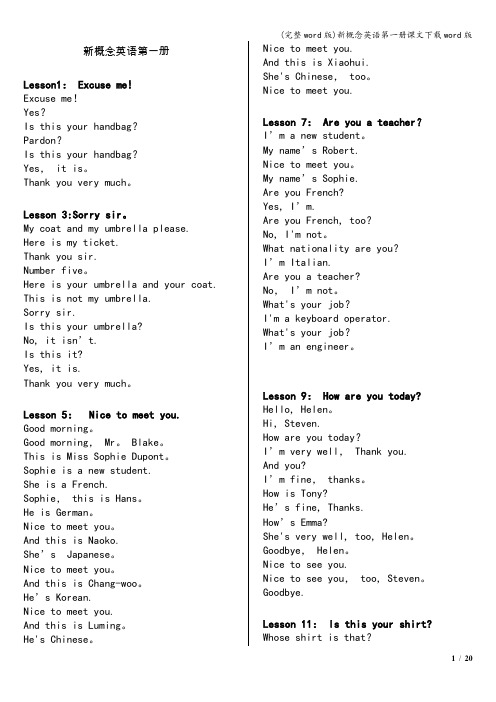
(完整word版)新概念英语第一册课文下载word版新概念英语第一册Lesson1: Excuse me!Excuse me!Yes?Is this your handbag?Pardon?Is this your handbag?Yes, it is。
Thank you very much。
Lesson 3:Sorry sir。
My coat and my umbrella please.Here is my ticket.Thank you sir.Number five。
Here is your umbrella and your coat. This is not my umbrella.Sorry sir.Is this your umbrella?No, it isn’t.Is this it?Yes, it is.Thank you very much。
Lesson 5: Nice to meet you.Good morning。
Good morning, Mr。
Blake。
This is Miss Sophie Dupont。
Sophie is a new student.She is a French.Sophie, this is Hans。
He is German。
Nice to meet you。
And this is Naoko.She’s Japanese。
Nice to meet you。
And this is Chang-woo。
He’s Korean.Nice to meet you.And this is Luming。
He's Chinese。
Nice to meet you.And this is Xiaohui.She's Chinese, too。
Nice to meet you.Lesson 7: Are you a teacher?I’m a new student。
新概念英语第一册Lesson19-20笔记(语法点+配套练习+答案)

四、语法解析
1. These ice creams arenice.
主系表结构中,对表语形容词提问用How
We aretired.对划线部分提问:How are you?
The man isold.对划线部分提问:How is the man?
You’reright. (正确的)
The desk is on theright. (右边)
shut
1.adj.关着的
2.v.关上
The door is shut.门关着。
Shut the door!关门!
Shut up!闭嘴!
What’s the matter?
=What’s wrong?
怎么了?
6. Not heavy meanslight.
7. Your mother’s mother is your grandmother.
8. Your father’s father is your grandfather.
用所给形容词的反义词填空:
1.These engineers are old. Those engineers areyoung.
Next week will be Alice’s birthday. I want togiveher(she) a gift.
Hurry up! Your mother is waitingforyou(you).
五、单词练习,根据首字母填空
1. What’s the matterwith you? I feel ill.
六、语法练习
1.用am, is或are填空
Those childrenarethirsty.
新概念英语第一册单词完整版
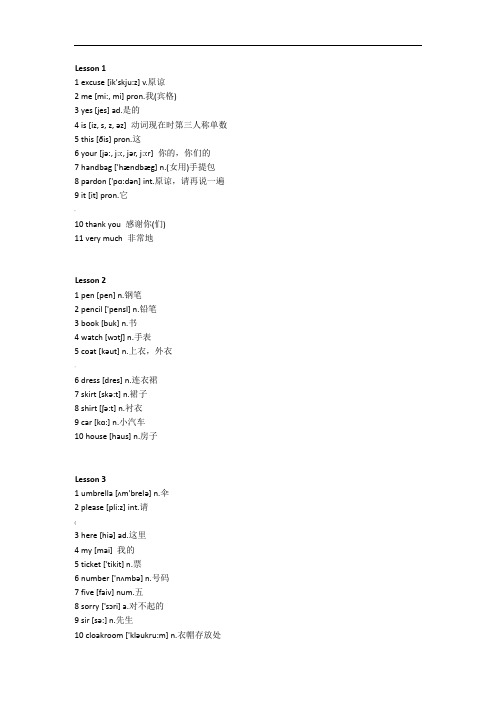
Lesson 11 excuse [ik'skju:z] v.原谅2 me [mi:, mi] pron.我(宾格)3 yes [jes] ad.是的4 is [iz, s, z, əz] 动词现在时第三人称单数5 this [ðis] pron.这6 your [jə:, jɔ:, jər, jɔ:r] 你的,你们的7 handbag ['hændbæg] n.(女用)手提包8 pardon ['pɑ:dən] int.原谅,请再说一遍9 it [it] pron.它'10 thank you 感谢你(们)11 very much 非常地Lesson 21 pen [pen] n.钢笔2 pencil ['pensl] n.铅笔3 book [buk] n.书4 watch [wɔtʃ] n.手表5 coat [kəut] n.上衣,外衣-6 dress [dres] n.连衣裙7 skirt [skə:t] n.裙子8 shirt [ʃə:t] n.衬衣9 car [kɑ:] n.小汽车10 house [haus] n.房子Lesson 31 umbrella [ʌm'brelə] n.伞2 please [pli:z] int.请(3 here [hiə] ad.这里4 my [mai] 我的5 ticket ['tikit] n.票6 number ['nʌmbə] n.号码7 five [faiv] num.五8 sorry ['sɔri] a.对不起的9 sir [sə:] n.先生10 cloakroom ['kləukru:m] n.衣帽存放处;Lesson 41 suit [su:t, sju:t] n.一套衣服 4 son [sʌn] n.儿子2 school [sku:l] n.学校3 teacher ['ti:tʃə] n.老师 5 daughter ['dɔ:tə] n.女儿Lesson 51 Mr. ['mistə] 先生2 good [gud] a.好3 morning ['mɔ:niŋ] n.早晨$4 Miss [mis] 小姐5 new [nju:] a.新的6 student ['stju:dənt] n.学生7 French [frentʃ] a.& n.法国人8 German ['dʒə:mən] a.& n.德国人9 nice ['nais] a.美好的10 meet [mi:t] v.遇见11 Japanese [ˌdʒæpə'ni:z] a.& n.日本人12 Korean [kə'riən] a.& n.韩国人13 Chinese [ˌtʃai'ni:z] a.& n.中国人!14 too [tu:] ad.也Lesson 61 make [meik] n.(产品的)牌号2 Swedish ['swi:diʃ] a.瑞典的3 English ['iŋgliʃ] a.英国的4 American [ə'merikən] a.美国的5 Italian [i'tæliən] a.意大利的6 Volvo ['vɔlvəʊ] n.沃尔沃7 Peugeot n.标致8 Mercedes ['mə:sidi:z] n.梅赛德斯9 Toyota ['təʊjəʊtə] n.丰田10 Daewoo n.大宇11 Mini ['mini] n.迷你12 Ford [fɔ:d] n.福特13 Fiat ['faiæt, -ət] n.菲亚特】Lesson 71 I [ai] pron.我2 am [m, əm, æm] 动词现在时第一人称单数3 are [ɑ:]动词现在时复数4 name ['neim] n.名字5 what [wɔt, wɑ:t] a.& pron.什么6 nationality [ˌnæʃə'næliti] n.国籍7 job [dʒɔb] n.工作8 keyboard ['ki:bɔ:d] n.电脑键盘`9 operator ['ɔpəreitə] n.操作人员10 engineer [ˌendʒi'niə] n.工程师Lesson 81 policeman [pə'li:smən] n.警察2 policewoman [pə'li:s,wumən] n.女警察3 taxi driver 出租汽车司机4 air hostess 空中小姐5 postman ['pəustmən] n.邮递员6 nurse [nə:s] n.护士7 mechanic [mi'kænik] n.机械师#8 hairdresser ['heəˌdresə] n.理发师9 housewife ['hauswaif] n.家庭妇女10 milkman ['milkmən] n.送牛奶的人Lesson 91 hello [hə'ləu] int.喂(表示问候)2 hi [hai] int.喂,嗨3 how [hau] ad.怎样4 today [tə'dei] ad.今天5 well [wel] a.身体好%6 fine [fain] a.美好的7 thanks [θæŋks] int.谢谢8 goodbye [ˌgud'bai] int.再见9 see [si:] v.见Lesson 101 fat [fæt] a.胖的2 woman ['wumən] n.女人3 thin [θin] a.瘦的4 tall [tɔ:l] a.高的5 short [ʃɔ:t] a.矮的6 dirty ['də:ti] a.脏的7 clean [kli:n] a.干净的8 hot [hɔt] a.热的@9 cold [kəuld] a.冷的10 old [əuld] a.老的11 young [jʌŋ] a.年轻的12 busy ['bizi] a.忙的13 lazy ['leizi] a.懒的Lesson 111 whose [hu:z] pron.谁的2 blue [blu:] a.蓝色的3 perhaps [pə'hæps] ad.大概。
Lesson19新概念英语第一册

生词和短语
thirsty ['θə:sti] a. 渴 mum ['mʌm] n. 妈妈(儿语) sit down [ˌsit'daun] 坐下 right [rait] a. 好,可以 ice cream [ˌais'kri:m] 冰淇淋
生词和短语
big [big] a.大的 small [smɔ:l] a.小的 open ['əupən] a.开着的 shut [ʃʌt] a.关着的
语法知识点
PART FOUR
语法知识点
1. 了解there be的含义 There is an ice cream man. 有个卖冰激凌的人。
There is a book on the desk. 桌上有本书。
There are sБайду номын сангаасme boys in the room. __________________
sh-/ʃ/ shoe/shake/she/share/shirt
Thank you!
light [lait] a.轻的 heavy ['hevi] a.重的 long [lɔŋ] a.长的 shoe [ʃu:] n.鞋子
生词和短语
生词和短语
grandfather ['grændˌfɑ:ðə] n.祖父,外祖父 grandmother ['grænˌmʌðə] n.祖母,外祖母
02
There’s some water in the cup. __________________
语法知识点 2. 可数名词变复数的不规则变化 ☆ 羊鹿鱼单复同形 sheep/deer/fish
语法知识点
2. 可数名词变复数的不规则变化
新概念英语1全单词表(带音标)完整版
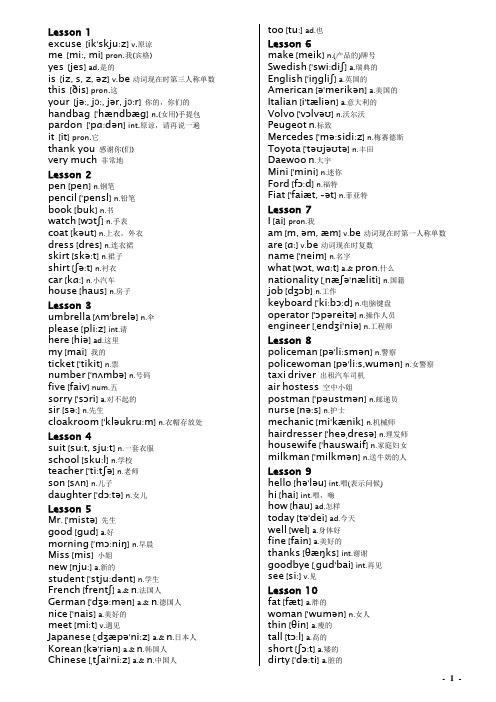
Lesson1excuse[ik'skju:z] v.原谅me[mi:, mi] pron.我(宾格)yes[jes] ad.是的is[iz, s, z, əz] v.be动词现在时第三人称单数this[ðis] pron.这your[jə:, jɔ:, jər, jɔ:r] 你的,你们的handbag['hændbæg] n.(女用)手提包pardon['pɑ:dən] int.原谅,请再说一遍it[it] pron.它thank you感谢你(们)very much非常地Lesson2pen[pen] n.钢笔pencil['pensl] n.铅笔book[buk] n.书watch[wɔtʃ] n.手表coat[kəut] n.上衣,外衣dress[dres] n.连衣裙skirt[skə:t] n.裙子shirt[ʃə:t] n.衬衣car[kɑ:] n.小汽车house[haus] n.房子Lesson3umbrella[ʌm'brelə] n.伞please[pli:z] int.请here[hiə] ad.这里my[mai]我的ticket['tikit] n.票number['nʌmbə] n.号码five[faiv] num.五sorry['sɔri] a.对不起的sir[sə:] n.先生cloakroom['kləukru:m] n.衣帽存放处Lesson4suit[su:t, sju:t] n.一套衣服school[sku:l] n.学校teacher['ti:tʃə] n.老师son[sʌn] n.儿子daughter['dɔ:tə] n.女儿Lesson5Mr. ['mistə]先生good[gud] a.好morning['mɔ:niŋ] n.早晨Miss[mis]小姐new[nju:] a.新的student['stju:dənt] n.学生French[frentʃ] a.& n.法国人German['dʒə:mən] a.& n.德国人nice['nais] a.美好的meet[mi:t] v.遇见Japanese[ˌdʒæpə'ni:z] a.& n.日本人Korean[kə'riən] a.& n.韩国人Chinese[ˌtʃai'ni:z] a.& n.中国人too[tu:] ad.也Lesson6make[meik] n.(产品的)牌号Swedish['swi:diʃ] a.瑞典的English['iŋgliʃ] a.英国的American[ə'merikən] a.美国的Italian[i'tæliən] a.意大利的Volvo['vɔlvəʊ] n.沃尔沃Peugeot n.标致Mercedes['mə:sidi:z] n.梅赛德斯Toyota['təʊjəʊtə] n.丰田Daewoo n.大宇Mini['mini] n.迷你Ford[fɔ:d] n.福特Fiat['faiæt, -ət] n.菲亚特Lesson7I[ai] pron.我am[m, əm, æm] v.be动词现在时第一人称单数are[ɑ:] v.be动词现在时复数name['neim] n.名字what[wɔt, wɑ:t] a.& pron.什么nationality[ˌnæʃə'næliti] n.国籍job[dʒɔb] n.工作keyboard['ki:bɔ:d] n.电脑键盘operator['ɔpəreitə] n.操作人员engineer[ˌendʒi'niə] n.工程师Lesson8policeman[pə'li:smən] n.警察policewoman[pə'li:s,wumən] n.女警察taxi driver出租汽车司机air hostess空中小姐postman['pəustmən] n.邮递员nurse[nə:s] n.护士mechanic[mi'kænik] n.机械师hairdresser['heəˌdresə] n.理发师housewife['hauswaif] n.家庭妇女milkman['milkmən] n.送牛奶的人Lesson9hello[hə'ləu] int.喂(表示问候)hi[hai] int.喂,嗨how[hau] ad.怎样today[tə'dei] ad.今天well[wel] a.身体好fine[fain] a.美好的thanks[θæŋks] int.谢谢goodbye[ˌgud'bai] int.再见see[si:] v.见Lesson10fat[fæt] a.胖的woman['wumən] n.女人thin[θin] a.瘦的tall[tɔ:l] a.高的short[ʃɔ:t] a.矮的dirty['də:ti] a.脏的- 1 -clean[kli:n] a.干净的hot[hɔt] a.热的cold[kəuld] a.冷的old[əuld] a.老的young[jʌŋ] a.年轻的busy['bizi] a.忙的lazy['leizi] a.懒的Lesson11whose[hu:z] pron.谁的blue[blu:] a.蓝色的perhaps[pə'hæps] ad.大概white[wait] a.白色的catch[kætʃ] v.抓住Lesson12father['fɑ:ðə] n.父亲mother['mʌðə] n.母亲blouse[blauz] n.女衬衫sister[sistə] n.姐,妹tie[tai] n.领带brother['brʌðə] n.兄,弟his[hiz]他的her[hə:]她的Lesson13colour['kʌlə] n.颜色green[gri:n] a.绿色come[kʌm] v.来upstairs[ˌʌp'steəz] ad.楼上smart[smɑ:t] a.时髦的,巧妙的hat[hæt] n.帽子same[seim] a.相同的lovely['lʌvli] a.可爱的,秀丽的Lesson14case[keis] n. 箱子carpet['kɑ:pit] n. 地毯dog[dɔg] n. 狗Lesson15Customs['kʌstəmz] n. 海关officer['ɔfisə] n. 官员girl[gə:l] n. 女孩,姑娘Danish['deiniʃ] a.& n. 丹麦人friend['deiniʃ] a.& n. 丹麦人Norwegian[nɔ:'wi:dʒən] a.& n. 挪威人passport['pɑ:spɔ:t] n. 护照brown[braun] a. 棕色的tourist['tuərist] n. 旅游者Lesson16Russian['rʌʃən] a.& n. 俄罗斯人Dutch[dʌtʃ] a.& n. 荷兰人these[ði:z] pron. 这些(this的复数) red[red] a. 红色的grey[grei] a. 灰色的yellow['jeləu] a. 黄色的black[blæk] a. 黑色的orange['ɔrindʒ] a. 橘黄色的Lesson17employee[im'plɔi-i:] n.雇员hard-working['hɑ:dwə:kiŋ] a. 勤奋的sales reps推销员man[mæn] n. 男人office['ɔfis] n. 办公室assistant[ə'sistənt] n. 助手Lesson19matter['mætə] n. 事情children['tʃildrən] n. 孩子们(child的复数) tired['taiəd] a. 累,疲乏boy[bɔi] n. 男孩thirsty['θə:sti] a. 渴mum['mʌm] n. 妈妈(儿语)sit down[ˌsit'daun] 坐下right[rait] a. 好,可以ice cream[ˌais'kri:m] 冰淇淋Lesson20big[big] a.大的small[smɔ:l] a.小的open['əupən] a.开着的shut[ʃʌt] a.关着的light[lait] a.轻的heavy['hevi] a.重的long[lɔŋ] a.长的shoe[ʃu:] n.鞋子grandfather['grændˌfɑ:ðə] n.祖父,外祖父grandmother['grænˌmʌðə] n.祖母,外祖母Lesson21give[giv] v. 给one[wʌn] pron. 一个which[witʃ] 哪一个Lesson22empty['empti] a.空的full[ful] a.满的large[lɑ:dʒ] a.大的little['litl] a.小的sharp[ʃɑ:p] a.尖的,锋利的small[smɔ:l] a.小的big[big] a.大的blunt[blʌnt] a.钝的box[bɔks] n.盒子,箱子glass[glɑ:s] n.杯子cup[kʌp] n.茶杯bottle['bɔtl] n.瓶子tin[tin] n.罐头knife[naif] n.刀子fork[fɔ:k] n.叉子Lesson23on[ɔn] prep. 在…之上shelf[ʃelf] n. 架子,搁板Lesson24desk[desk] n.课桌table['teibəl] n.桌子- 2 -plate[pleit] n.盘子cupboard['kʌbəd] n.食橱cigarette[ˌsigə'ret] n.香烟television['teliˌviʒən, ˌteli'viʒən] n.电视机floor[flɔ:] n.地板dressing table梳妆台magazine[ˌmægə'zi:n] n.杂志bed[bed] n.床newspaper['nju:sˌpeipə] n.报纸stereo['steriəu, 'stiər-] n.立体声音响Lesson25Mrs. ['misiz]夫人kitchen['kitʃin] n.厨房refrigerator[ri'fridʒəreitə] n.电冰箱right[rait] n.右边electric[i'lektrik] a.带电的,可通电的left[left] n.左边cooker['kukə] n.炉子,炊具middle['midl] n.中间of[əv, ə, ɔv] prep.(属于)…的room[ru:m] n.房间cup[kʌp] n.杯子Lesson26where[weə] ad.在哪里in[in] prep.在…里Lesson27living room['liviŋru:m]客厅near[niə] prep.靠近window['windəu] n.窗户armchair['ɑ:mtʃeə] n.手扶椅door[dɔ:] n.门picture['piktʃə] n.图画wall[wɔ:l] n.墙Lesson28trousers['trauzəz] n.〔复数〕长裤Lesson29shut[ʃʌt] v.关门bedroom['bedrum, -ru:m] n.卧室untidy[ˌʌn'taidi] a.乱,不整齐must[mʌst] moda l verb.必须,应该open['əupən] v.打开air[eə] v.使…通风,换换空气put[put] v.放置clothes[kləuðz] n.衣服wardrobe['wɔ:drəub] n.大衣柜dust[dʌst] v.掸掉灰尘sweep[swi:p] v.扫Lesson30empty['empti] v.倒空,使…变空read[ri:d] v.读sharpen['ʃɑ:pən] v.削尖,使锋利put on[ˌput'ɔn]穿上take off脱掉turn on[tə:nɔn]开(电灯) turn off关(电灯)Lesson31garden['gɑ:dn] n.花园under['ʌndə] prep.在…之下tree[tri:] n.树climb[klaim] v.爬,攀登who[hu:] pron.谁run[rʌn] v.跑grass[grɑ:s] n.草,草地after['ɑ:ftə] prep.在…之后cat[kæt] n.猫Lesson32type[taip] v.打字letter['letə] n.信basket['bɑ:skit] n.篮子eat[i:t] v.吃bone[bəun] n.骨头clean[kli:n] v.清洗tooth[tu:θ] n.牙齿cook[kuk] v.做(饭菜)milk[milk] n.牛奶meal[mi:l] n.饭,一顿饭drink[driŋk] v.喝tap[tæp] n.(水)龙头Lesson33day[dei] n.日子cloud[klaud] n.云sky[skai] n.天空sun[sʌn] n.太阳shine[ʃain] v.照耀with[wið, wiθ] prep.和…在一起family['fæməli] n.家庭(成员)walk[wɔ:k] v.走路,步行over['əuvə] prep.跨越,在…之上bridge[bridʒ] n.桥boat[bəut] n.船river['rivə] n.河ship[ʃip] n.轮船aeroplane['eərəplein] n.飞机fly[flai] v.飞Lesson34sleep[sli:p] v.睡觉shave[ʃeiv] v.刮脸cry[krai] v.哭,喊wash[wɔʃ] v.洗wait[weit] v.等jump[dʒʌmp] v.跳Lesson35photograph['fəutəgrɑ:f] n.照片village['vilidʒ] n.村庄valley['væli] n.山谷between[bi'twi:n] prep.在…之间hill[hil] n.小山another[ə'nʌðə] prep.另一个- 3 -wife[waif] n.妻子along[ə'lɔŋ] prep.沿着bank[bæŋk] n.河岸water['wɔ:tə] n.水swim[swim] v.游泳across[ə'krɔs] prep.横过building['bildiŋ] n.大楼,建筑物park[pɑ:k] n.公园into['intu, 'intə] prep.进入Lesson36beside[bi'said] prep.在…旁off[ɔf] prep.离开Lesson37work[wə:k] v.工作hard['hɑ:d] ad.努力地make[meik] v.做bookcase['buk-keis] n.书橱,书架hammer['hæmə] n.锤子paint[peint] v.上漆,涂pink[piŋk] n.& a.粉红色favourite['feivərit] a.最喜欢的Lesson38homework['həumwə:k] n.作业listen['lisən] v.听dish[diʃ] n.盘子,碟子Lesson39front[frʌnt] n.前面in front of在…之前careful['keəful] a.小心的,仔细的vase[vɑ:z, veis, veiz] n.花瓶drop[drɔp] v.掉下flower['flauə] n.花Lesson40show[ʃəu] v.给…看send[send] v.送给take[teik] v.带给Lesson41cheese[tʃi:z] n.乳酪,干酪bread[bred] n.面包soap[səup] n.肥皂chocolate['tʃɔklit] n.巧克力sugar['ʃugə] n.糖coffee['kɔfi] n.咖啡tea[ti:] n.茶tobacco[tə'bækəu] n.烟草,烟丝Lesson42bird[bə:d] n.鸟any['eni] det.一些some[sʌm] det.一些Lesson43of course[əv'kɔ:s]当然kettle['ketl] n.水壶behind[bi'haind] prep.在…后面teapot['ti:pɔt] n.茶壶now[nau] ad.现在,此刻find[faind] v.找到boil[bɔil] v.沸腾,开Lesson45can[kæn]能够boss[bɔs] n.老板,上司minute['minit, mai'nju:t] n.分(钟) ask[ɑ:sk] v.请求,要求handwriting['hændˌraitiŋ] n.书写terrible['terəbəl] a.糟糕的,可怕的Lesson46lift[lift] v.拿起,搬起,举起cake[keik] n.饼,蛋糕biscuit['biskit] n.饼干Lesson47like[laik] v.喜欢,想要want[wɔnt, wɑ:nt] v.想Lesson48fresh[freʃ] a.新鲜的egg[eg] n.鸡蛋butter['bʌtə] n.黄油pure[pjuə] a.纯净的honey['hʌni] n.蜂蜜ripe[raip] a.成熟的banana[bə'nɑ:nə] n.香蕉jam[dʒæm] n.果酱sweet[swi:t] a.甜的orange['ɔrindʒ] n.橙Scotch whisky苏格兰威士忌choice[tʃɔis] a.上等的,精选的apple['æpəl] n.苹果wine[wain] n.酒,果酒beer[biə] n.啤酒blackboard['blækbɔ:d] n.黑板Lesson49butcher['butʃə] n.卖肉的meat[mi:t] n.(食用)肉beef[bi:f] n.牛肉lamb[læm] n.羔羊肉husband['hʌzbənd] n.丈夫steak[steik] n.牛排mince[mins] n.肉馅,绞肉chicken['tʃikin] n.鸡tell[tel] v.告诉truth[tru:θ] n.实情either['aiðə] ad.也(用于否定句) Lesson50tomato[tə'mɑ:təu] n.西红柿potato[pə'teitəu] n.土豆cabbage['kæbidʒ] n.卷心菜lettuce['letis] n.莴苣pea[pi:] n.豌豆bean[bi:n] n.豆角- 4 -pear[peə] n.梨grape[greip] n.葡萄peach[pi:tʃ] n.桃Lesson51Greece[gri:s] n.希腊climate['klaimit] n.气候country['kʌntri] n.国家pleasant['plezənt] a.宜人的weather['weðə] n.天气spring[spriŋ] n.春季windy['windi] a.有风的warm[wɔ:m] a.温暖的rain[rein] v.下雨sometimes['sʌmtaimz] ad.有时summer['sʌmə] n.夏天autumn['ɔ:təm] n.秋天winter['wintə] n.冬天snow[snəu] v.下雪January['dʒænjuəri] n.月February['februəri] n.月March[mɑ:tʃ] n.月April['eiprəl] n.月May[mei] n.月June[dʒu:n] n.月July[dʒu'lai] n.月August['ɔ:gəst] n.月September[sep'tembə] n.月October[ɔk'təubə] n.月November[nəu'vembə] n.月December[di'sembə] n.月Lesson52the U.S. 美国Brazil[brə'zil] n.巴西Holland['hɔlənd] n.荷兰England['iŋglənd] n.英国France['fræns] n.法国Germany['dʒə:məni] n.德国Italy['itəli] n.意大利Norway['nɔ:wei] n.挪威Russia['rʌʃə] n.俄罗斯Spain[spein] n.西班牙Sweden['swi:dn] n.瑞典Lesson53mild[maild] a.温和的,温暖的always['ɔ:lweiz] ad.总是north[nɔ:θ] n.北方east[i:st] n.东方wet[wet] a.潮湿的west[west] n.西方south[sauθ] n.南方season['si:zən] n.季节best[best] ad.最night[nait] n.夜晚rise[raiz] v.升起early['ə:li] ad.早set[set] v.(太阳)落下去late[leit] ad.晚,迟interesting['intristiŋ] a.有趣的,有意思的subject['sʌbdʒikt] n.话题conversation[ˌkɔnvə'seiʃən] n.谈话Lesson54Australia[ɔ'streiliə] n.澳大利亚Australian[ɔ'streiliən] n.澳大利亚人Austria['ɔstriə] n.奥地利Austrian['ɔstriən] n.奥地利人Canada['kænədə] n.加拿大Canadian[kə'neidiən] n.加拿大人China['tʃainə] n.中国Finland['finlənd] n.芬兰Finnish['finiʃ] n.芬兰人India['indiə] n.印度Indian['indiən] n.印度人Japan[dʒə'pæn] n.日本Nigeria[nai'dʒiəriə] n.尼日利亚Nigerian[nai'dʒiəriən] n.尼日利亚人Turkey['tə:ki] n.土耳其Turkish['tə:kiʃ] n.土耳其人Korea[kə'riə, kɔ(:)'riə] n.韩国Polish['pəuliʃ] n.波兰人Poland['pəulənd] n.波兰Thai[tai] n.泰国人Thailand['tailænd] n.泰国Lesson55live[liv] v.住,生活stay[stei] v.呆在,停留home[həum] n.家ad.在家,到家housework['hauswə:k] n.家务lunch[lʌntʃ] n.午饭afternoon[ˌɑ:ftə'nu:n] n.下午usually['ju:ʒuəli, 'ju:ʒəli] ad.通常together[tə'geðə] ad.一起evening['i:vniŋ] n.晚上arrive[ə'raiv] v.到达night[nait] n.夜间Lesson57o'clock[ə'klɔk] ad.点钟shop[ʃɔp] n.商店moment['məumənt] n.片刻,瞬间Lesson59envelope['envələup] n.信封writing paper信纸shop assistant售货员size[saiz] n.尺寸,尺码,大小pad[pæd] n.信笺簿glue[glu:] n.胶水chalk[tʃɔ:k] n.粉笔change[tʃeindʒ] n.零钱,找给的钱Lesson61- 5 -feel[fi:l] v.感觉look[luk] v.看(起来)must[mʌst]必须call[kɔ:l] v.叫,请doctor['dɔktə] n.医生telephone['telifəun] n.电话remember[ri'membə] v.记得,记住mouth[mauθ] n.嘴tongue[tʌŋ] n.舌头bad[bæd] a.坏的,严重的cold[kəuld] n.感冒news[nju:z] n.消息headache['hedeik] n.头痛aspirin['æspərin] n.阿斯匹林earache['iəreik] n.耳痛toothache['tu:θeik] n.牙痛dentist['dentist] n.牙医stomach ache胃痛medicine['medsən] n.药temperature['tempərətʃə] n.温度flu[flu:] n.流行性感冒measles['mi:zəlz] n.麻疹mumps[mʌmps] n.腮腺炎Lesson63better['betə] a.形容词well的比较级certainly['sə:tənli] ad.当然get up[getʌp]起床yet[jet] ad.还,仍rich[ritʃ] a.油腻的food[fu:d] n.食物remain[ri'mein] v.保持,继续Lesson64play[plei] v.玩match[mætʃ] n.火柴talk[tɔ:k] v.谈话library['laibrəri] n.图书馆drive[draiv] v.开车so[səu] ad.如此地quickly['kwikli] ad.快地lean out of身体探出break[breik] v.打破Lesson65Dad[dæd] n.爸(儿语)key[ki:] n.钥匙baby['beibi] n.婴儿hear[hiə] v.听见enjoy[in'dʒɔi] v.玩得快活yourself[jə'self] pron.你自己ourselves[auə'selvz] pron.我们自己Lesson66myself[mai'self] pron.我自己themselves[ðəm'selvz] pron.他们自己himself[him'self] pron.他自己herself[hə:'self] pron.她自己Lesson67greengrocer['gri:nˌgrəusə] n.蔬菜水果零售商absent['æbsənt, əb'sent] a.缺席的Monday['mʌndi] n.星期一Tuesday['tju:zdi:, 'tu:z-] n.星期二Wednesday['wenzdi] n.星期三Thursday['θə:zdi]星期四keep[ki:p] v.(身体健康)处于(状况)spend[spend] v.度过weekend['wi:kend, ˌwi:k'end] n.周末Friday['fraidi] n.星期五Saturday['sætədi] n.星期六Sunday['sʌndi] n.星期日country['kʌntri] n.乡村lucky['lʌki] a.幸运的Lesson68church[tʃə:tʃ] n.教堂dairy['deəri] n.乳品店baker['beikə] n.面包师傅grocer['grəusə] n.食品杂货商Lesson69year[jiə, jə:] n.年race[reis] n.比赛town[taun] n.城镇crowd[kraud] n.人群stand[stænd] v.站立exciting[ik'saitiŋ] a.使人激动的just[dʒʌst] ad.正好,恰好finish['finiʃ] n.结尾,结束winner['winə] n.获胜者behind[bi'haind] prop.在…之后way[wei] n.路途Lesson71awful['ɔ:ful] ad.让人讨厌的,坏的telephone['telifəun] v.& n.打电话time[taim] n.次(数)answer['ɑ:nsə] v.接(电话)last[lɑ:st] a.最后的,前一次的phone[fəun] n.电话(=telephone) again[ə'gein] ad.又一次地say[sei] v.说Lesson73week[wi:k] n.周London['lʌndən] n.伦敦suddenly['sʌdnli] ad.突然地bus stop['bʌstɔp]公共汽车车站smile[smail] v.微笑pleasantly['plezntli] ad.愉快地understand[ˌʌndə'stænd] v.懂,明白speak[spi:k] v.讲,说hand[hænd] n.手pocket['pɔkit] n.衣袋phrasebook n.短语手册,常用语手册phrase[freiz] n.短语- 6 -slowly['sləuli] ad.缓慢地Lesson74hurriedly['hʌridli] ad.匆忙地cut[kʌt] v.割,切thirstily['θə:stili] ad.口渴地go[gəu] v.走greet[gri:t] v.问候,找招呼Lesson75ago[ə'gəu] ad.以前buy[bai] v.买pair[peə] n.双,对fashion['fæʃən] n.(服装的)流行式样uncomfortable[ʌn'kʌmftəbəl] a.不舒服的wear[weə] v.穿着Lesson77appointment[ə'pɔintmənt] n.约会,预约urgent['ə:dʒənt] a.紧急的,急迫的till[til] prep.直到…为止Lesson79shopping['ʃɔpiŋ] n.购物list[list] n.单子vegetable['vedʒtəbəl] n.蔬菜need[ni:d] v.需要hope[həup] v.希望thing[θiŋ] n.事情money['mʌni] n.钱Lesson80groceries['grəusəriz] n.食品杂货fruit[fru:t] n.水果stationery['steiʃənəri, -neri] n.文具newsagent['nju:zˌeidʒənt] n.报刊零售人chemist['kemist] n.化剂师,化学家Lesson81bath[bɑ:θ] n.洗澡nearly['niəli] ad.几乎,将近ready['redi] a.准备好的,完好的dinner['dinə] n.正餐,晚餐restaurant['restərɔnt] n.饭馆,餐馆roast[rəust] a.烤的Lesson82breakfast['brekfəst] n.早饭haircut['heəkʌt] n.理发party['pɑ:ti] n.聚会holiday['hɔlidi] n.假日Lesson83mess[mes] n.杂乱,凌乱pack[pæk] v.包装,打包,装箱suitcase['su:tkeis, 'sju:t] n.手提箱leave[li:v] v.离开already[ɔ:l'redi] ad.已经Lesson85Paris['pæris] n.巴黎cinema['sinimə] n.电影院film[film] n.电影beautiful['bju:tifəl] a.漂亮的city['siti] n.城市never['nevə] ad.从来没有ever['evə] ad.在任何时候Lesson87attendant[ə'tendənt] n.接待员bring[briŋ] v.带来,送来garage['gærɑ:ʒ] n.车库,汽车修理厂crash[kræʃ] n.碰撞lamp-post[læmp pəust]灯杆repair[ri'peə] v.修理try[trai] v.努力,设法Lesson89believe[bi'li:v] v.相信,认为may[mei] (用于请求许可)可以how long多长since[sins] prep.自从why[wai] ad.为什么sell[sel] v.卖,出售because[bi'kɔz] conj.因为retire[ri'taiə] v.退休cost[kɔst] v.花费pound[paund] n.英镑worth[wə:θ] prep.值…钱penny['peni] n.便士Lesson91still[stil] ad.还,仍旧move[mu:v] v.搬家miss[mis] v.想念,思念neighbour['neibə] n.邻居person['pə:sn] n.人people['pi:pl] n.人们poor[puə] a.可怜的Lesson93pilot['pailət] n.飞行员return[ri'tə:n] v.返回New York['nju: 'jɔ:k] n.纽约Tokyo['təukjəu] n.东京Madrid[mə'drid] n.马德里fly[flai] v.飞行Lesson94Athens['æθinz] n.雅典Berlin[bə:'lin] n.柏林Bombay[bɔm'bei] n.孟买Geneva[dʒi'ni:və] n.日内瓦Moscow['mɔskəu] n.莫斯科Rome[rəum] n.罗马Seoul[səul] n.汉城Stockholm['stɔkhoum] n.斯德哥尔摩Sydney['sidni] n.悉尼Lesson95return[ri'tə:n] n.往返train[trein] n.火车- 7 -platform['plætfɔ:m] n.站台plenty['plenti] n.大量bar[bɑ:] n.酒吧station['steiʃən] n.车站,火车站catch[kætʃ] v.赶上miss[mis] v.错过Lesson97leave[li:v] v.遗留describe[di'skraib] v.描述zip[zip] n.拉链label['leibəl] n.标签handle['hændl] n.提手,把手address[ə'dres] n.地址pence[pens] n.penny的复数形式belong[bi'lɔŋ] v.属于Lesson99ow[au] int.哎哟slip[slip] v.滑倒,滑了一脚fall[fɔ:l] v.落下,跌倒downstairs[ˌdaun'steəz] ad.下楼hurt[hə:t] v.伤,伤害,疼痛back[bæk] n.背stand up起立,站起来help[help] v.帮助at once[ət 'wʌns]立即sure[ʃuə] a.一定的,确信的X-ray['eksrei] n.X光透视Lesson101Scotland['skɔtlənd] n.苏格兰(英国) card[kɑ:d] n.明信片youth[ju:θ] n.青年hostel['hɔstəl] n.招待所,旅馆association[əˌsəusi'eiʃən] n.协会soon[su:n] ad.不久write[rait] v.写Lesson103exam[ig'zæm] n.考试pass[pɑ:s] v.及格,通过mathematics[ˌmæθə'mætiks] n.数学question['kwestʃən] n.问题easy['i:zi] a.容易的enough[i'nʌf] ad.足够地paper['peipə] n.考卷fail[feil] v.未及格,失败answer['ɑ:nsə] v.回答mark[mɑ:k] n.分数rest[rest] n.其他的东西difficult['difikəlt] a.困难的hate[heit] v.讨厌low[ləu] a.低的cheer[tʃiə] v.振作,振奋guy[gai] n.家伙,人top[tɔp] n.上方,顶部Lesson104clever['klevə] a.聪明的stupid['stju:pid] a.笨的cheap[tʃi:p] a.便宜的expensive[ik'spensiv] a.贵的fresh[freʃ] a.新鲜的stale[steil] a.变馊的low[ləu] a.低的,矮的loud[laud] a.大声的high[hai] a.高的hard['hɑ:d] a.硬的sweet[swi:t] a.甜的soft[sɔft] a.软的sour[sauə] a.酸的Lesson105spell[spel] v.拼写intelligent[in'telidʒənt] a.聪明的,有智慧的mistake[mis'teik] n.错误present[pri'zent, 'prezənt] n.礼物dictionary['dikʃənəri] n.词典Lesson106carry['kæri] v.携带correct[kə'rekt] v.改正,纠正Lesson107madam['mædəm] n.夫人,女士(对妇女的尊称) as well同样suit[su:t, sju:t] v.适于pretty['priti] a.漂亮的Lesson109idea[ai'diə] n.主意a little少许(用于不可数名词之前) teaspoonful['ti:spu:nful] n.一满茶匙less[les] a.(little的比较级)校少的,更小的a few几个(用于可数名词之前)pity['piti] n.遗憾instead[in'sted] ad.代替advice[əd'vais] n.建议,忠告Lesson110most[məust] a.(many,much的最高级)最多的least[li:st] a.(little的最高级)最小的,最少的best[best] a.(good的最高级)最好的worse[wə:s] a.(bad的比较级)更坏的worst[wə:st] a.(bad的最高级)最坏的Lesson111model['mɔdl] n.型号,式样afford[ə'fɔ:d] v.付得起(钱)deposit[di'pɔzit] n.预付定金instalment[in'stɔ:lmənt] n.分期付款price[prais] n.价格millionaire[ˌmiljə'neə] n.百万富翁Lesson113conductor[kən'dʌktə] n.售票员fare[feə] n.车费,车票change[tʃeindʒ] v.兑换(钱)note[nəut] n.纸币- 8 -passenger['pæsindʒə] n.乘客none[nʌn] pron.没有任何东西neither['naiðə, 'ni:ðə] ad.也不get off下车tramp[træmp] n.流浪汉except[ik'sept] prep.除…外Lesson115anyone['eniwʌn]pron.(用于疑问句,否定式)任何人knock[nɔk] v.敲,打everything['evriθiŋ] pron.一切事物quiet['kwaiət] a.宁静的,安静的impossible[im'pɔsəbəl] a.不可能的invite[in'vait] v.邀请anything['eniθiŋ] pron.任何东西nothing['nʌθiŋ] pron.什么也没有lemonade[ˌlemə'neid] n.柠檬水joke[dʒəuk] v.开玩笑Lesson116asleep[ə'sli:p] a.睡觉,睡着(用作表语) glasses['gla:siz] n.眼镜Lesson117dining room饭厅coin[kɔin] n.硬币mouth[mauθ] n.嘴swallow[swɔləu] v.吞下later['leitə] ad.后来toilet['tɔilit] n.厕所,盥洗室Lesson118ring[riŋ] v.响Lesson119story['stɔ:ri] n.故事happen['hæpən] v.发生thief[θi:f] n.贼enter['entə] v.进入dark[dɑ:k] a.黑暗的torch[tɔ:tʃ] n.手电筒voice[vɔis] n.(说话的)声音parrot['pærət] n.鹦鹉Lesson120exercise book练习本Lesson121customer['kʌstəmə] n.顾客forget[fə'get] v.忘记manager['mænidʒə] n.经理serve[sə:v] v.照应,服务,接待counter['kauntə] n.柜台recognize['rekəgnaiz] v.认识Lesson122road[rəud] n.路Lesson123during['djuəriŋ] prep.在…期间trip[trip] n.旅行travel['trævəl] v.旅行offer['ɔfə] v.提供job[dʒɔb] n.工作guess[ges] v.猜grow[grəu] v.长,让…生长beard[biəd] n.(下巴上的)胡子,络腮胡子Lesson124kitten['kitn] n.小猫Lesson125water['wɔ:tə] v.浇水terribly['terəbli] ad.非常dry[drai] a.干燥的,干的nuisance['nju:səns] n.讨厌的东西或人mean[mi:n] v.意味着,意思是surprise[sə'praiz] n.惊奇,意外的事Lesson126immediately[i'mi:diətli] ad.立即地Lesson127famous['feiməs] a.著名的actress['æktris] n.女演员at least至少actor['æktə] n.男演员read[ri:d] v.通过阅读得知Lesson129wave[weiv] v.招手track[træk] n.跑道mile[mail] n.英里overtake[ˌəuvə'teik] v.从后面超越,超车speed[spi:d]限速dream[dri:m] v.做梦,思想不集中sign[sain] n.标记,牌子driving licence['draiviŋ 'laisəns]驾驶执照charge[tʃɑ:dʒ] v.罚款darling['dɑ:liŋ] n.亲爱的(用作表示称呼) Lesson131Egypt['i:dʒipt] n.埃及abroad[ə'brɔ:d] ad.国外worry['wʌri] v.担忧Lesson133reporter[ri'pɔ:tə] n.记者sensational[sen'seiʃənəl]a.爆炸性的,耸人听闻的mink coat['miŋk-kəut]貂皮大衣Lesson135future['fju:tʃə] n.未来的get married结婚hotel[həu'tel] n.饭店latest['leitist] a.最新的introduce['intrə'dju:s] v.介绍Lesson137football['futbɔ:l] n.足球pool[pu:l] n.赌注win[win] v.赢world[wə:ld] n.世界poor[puə] a.贫穷的- 9 -depend[di'pend] v.依靠(on)Lesson139extra['ekstrə] a.额外的engineer[ˌendʒi'niə] n.工程师overseas[ˌəuvə'si:z] a.海外的,国外的engineering[ˌendʒi'niəriŋ] n.工程company['kʌmpəni] n.公司line[lain] n.线路Lesson141excited[ik'saitid] a.兴奋的get on登上middle-aged['midl'eidʒid] a.中年的opposite['ɔpəzit] prep.在…对面curiously['kjuəriəsli] ad.好奇地funny['fʌni] a.可笑的,滑稽的powder['paudə] n.香粉compact['kɔmpækt] n.带镜的化妆盒kindly['kaindli] ad.和蔼地ugly['ʌgli] a.丑陋的amused[ə'mju:zd] a.有趣的smile[smail] v.微笑embarrassed[im'bærəst] a.尴尬的,窘迫的Lesson142worried['wʌrid] a.担心,担忧regularly['regjuləli] ad.经常地,定期地Lesson143surround [sə'raund] v.包围wood [wud] n.树林beauty spot风景点hundred ['hʌndrid] n.百city ['siti] n.城市through [θru:] prep.穿过visitor ['vizitə] n.参观者,游客,来访者tidy ['taidi] a.整齐的litter ['litə] n.杂乱的东西litter basket废物筐place [pleis] v.放throw [θrəu] v.扔,抛rubbish ['rʌbiʃ] n.垃圾count[kaunt] v.数,点cover ['kʌvə] v.覆盖piece[pi:s] n.碎片tyre['taiə] n.轮胎rusty ['rʌsti] a.生锈的among [ə'mʌŋ] prep.在…之间prosecute['prɔsikju:t] v.依法处置- 10 -。
新概念英语第一册课后习题及答案:Lesson19-20

新概念英语第一册课后习题及答案:Lesson19-20Written exercises 书面练习A Complete these sentences using am, is or are. 抄写以下句子,用am, is或are填空。
Example: Those children ______ thirsty. Those children are thirsty. 1 Those children ______ tired. 2 Their mother______ tired, too. 3 That ice cream man ______ very busy. 4 His ice creams ______ very nice. 5 What's the matter, children? We ______ thirsty. 6 What's the matter, Tim? I______ tired.B Write questions and answers. 模仿例句提问并回答。
Example: his shoes/(dirty)/clean Are his shoes dirty on clean? They're not dirty. They're clean. 1 thechildren/(tired)/thirsty 2 the postmen/(cold)/hot 3 the hairdressers/(thin)fat 4 the shoes/(small)/big 5 theshops/(shut)/open 6 his cases/(heavy)/light 7 grandmother and grandfather/(young)/old 8 their hats/(old)/new 9 the policemen/(short)/tall 10 his trousers/(short)/long答案:Lesson 20A1 Those children are tired.2 Their mother is tired, too.3 That ice cream man is very busy.4 His ice creams are very nice.5 What's the matter, children? We are thirsty.6 What's the matter, Tim? I am tired.AnswersB1 Are the children tired or thirsty? They're not tired. They're thirsty.2 Are the postmen cold or hot? They're not cold. They're hot.3 Are the hairdressers thin or fat? They're not thin. They're fat.4 Are the shoes small or big? They're not small. They're big.5 Are the shops shut or open? They're not shut. They're open.6 Are his cases heavy or light? They're not heavy.They're light.7 Are grandmother and grandfather young or old? They're not young. They're old.8 Are their hats old or new? They're not old. They're new.9 Are the policemen short or tall? They're not short. They're tall.10 Are his trousers short or long? They're not short. They're long.。
新概念英语第一册第19-20课教案(经典教案课件)

Lesson19Tired and thi rsty[词汇](9)★matter n.事情(尤其强调麻烦)①n.事情,事件It's a private matter.He's not very interested in such matters.②n.麻烦事,困难What's the matter?=Tell me what's wrong?eg.What's the matter with+sb./sth.What's the matter with you today?你今天怎么回事?What's the matter with the children?③v.要紧eg.It doesn't matter,没关系。
It matters to him,和他有关系。
Does it matter?有关系吗?可以吗?短语:eg.as a matter of fact事实上,其实=in factno matter无论no matter where you go=wherever you go无论你去哪里no matter what you do=whatever you do无论你干什么(以上2句在《right here waiting for you》一歌中出现)★children n,孩子们(child的复数)eg.Tom is a lovely child.baby婴儿the only child独生子女childhood童年(-hood后缀)(通常表达一种状态,做儿童的状态)my childhood我的童年motherhood做母亲的那种状态一为人母fatherhood为人父neighborhood街坊★tired①adj.累,疲乏eg.Jack always has lots of work to do and he feels tired.②adj.厌烦的be tired of sth./doing sth.厌烦做某事(be tired of对什么感到很累,引申为“厌烦,讨厌”。
新概念英语第一册第19-20课-Tired-and-thirsty
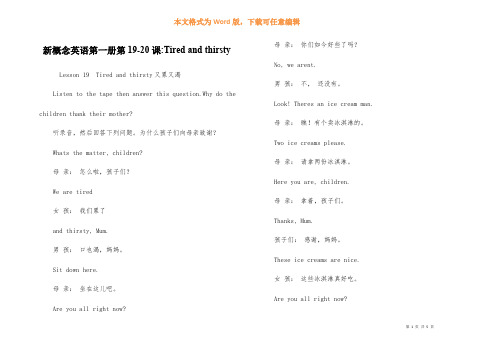
新概念英语第一册第19-20课:Tired and thirsty Lesson 19 Tired and thirsty又累又渴Listen to the tape then answer this question.Why do the children thank their mother?听录音,然后回答下列问题。
为什么孩子们向母亲致谢?Whats the matter, children?母亲:怎么啦,孩子们?We are tired女孩:我们累了and thirsty, Mum.男孩:口也渴,妈妈。
Sit down here.母亲:坐在这儿吧。
Are you all right now? 母亲:你们如今好些了吗?No, we arent.男孩:不,还没有。
Look! Theres an ice cream man. 母亲:瞧!有个卖冰淇淋的。
Two ice creams please.母亲:请拿两份冰淇淋。
Here you are, children.母亲:拿着,孩子们。
Thanks, Mum.孩子们:感谢,妈妈。
These ice creams are nice.女孩:这些冰淇淋真好吃。
Are you all right now?母亲:你们如今好了吗?Yes, we are, thank you.孩子们:是的,如今好了,感谢您!New Word and expressions 生词和短语mattern. 事情childrenn. 孩子们〔child的复数〕tiredadj. 累,疲乏boyn. 男孩thirstyadj. 渴Mumn. 妈妈〔儿语〕sit down坐下rightadj. 好,可以ice cream冰淇淋Notes on the text课文解释1 Whats the matter?=Tell me whats wrong.怎么啦?2 Theres=There is.Lesson 20 look at them!看看他/它们!New words and expressions生词和短语big adj. 大的small adj.小的open adj.开着的shut adj.关着的light adj.轻的heavy adj.重的long adj.长的shoen.鞋子grandfathern.祖父,外祖父grandmothern.祖母,外祖母Lesson 19-20 自学导读First things first课文详注 Further notes on the text1.Whats the matter?怎么啦?相当于 Whats wrong?或 Tell me whats wrong。
新概念英语Lesson19-20(共35页)课件
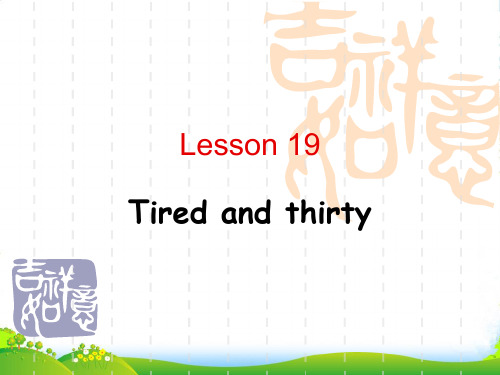
里的学生有强烈的求知欲。
▪
▪ boy n. 男孩
▪ ---- Who are those boys?
▪ ---- They are his sons. ▪ Boy! 我的天啊! 单独使用并大写首字
母,可以充当一个感叹词。
▪ ★thirsty adj. 渴 ▪ ① adj. 渴的,口干的
▪ We are tired and thirty.
▪ sick 生病,难受,尤指恶心的那种。 ▪ I’m sick of it. 我特烦那事。 ▪ be sick of 一见到…就恶心,引申为“讨厌”。
▪9、阅读使人充实,会谈使人敏捷,写作与笔记使人精确……史鉴使人明智;诗歌使人巧慧2021/9/252021/9/25Saturday, September 25, 2021 ▪10、每一本书是一级小阶梯,我每爬上一级,就更脱离畜生而上升到人类,更接近美好生活的观念,更热爱书籍。2021/9/252021/9/252021/9/259/25/2021 7:38:01 PM ▪11、书是人类进步的阶梯,终生的伴侣,最诚挚的朋友。2021/9/252021/9/252021/9/25Sep-2125-Sep-21 ▪12、阅读一本不适合自己阅读的书,比不阅读还要坏。我们必须会这样一种本领,选择最有价值、最适合自己所需要的读物。2021/9/252021/9/252021/9/25Saturday, September 25, 2021 13、He who seize the right moment, is the right man.谁把握机遇,谁就心想事成。2021/9/252021/9/252021/9/252021/9/259/25/2021 ▪14、谁要是自己还没有发展培养和教育好,他就不能发展培养和教育别人。2021年9月25日星期六2021/9/252021/9/252021/9/25 ▪15、一个爱书的人,他必定不致缺少一个忠实的朋友,一个良好的老师,一个可爱的伴侣,一个优婉的安慰者。2021年9月2021/9/252021/9/252021/9/259/25/2021 ▪16、提出一个问题往往比解决一个更重要。因为解决问题也许仅是一个数学上或实验上的技能而已,而提出新的问题,却需要有创造性的想像力,而且标志着科学的真正进步。 2021/9/252021/9/25September 25, 2021 ▪17、看文字须大段精彩看,耸起精神,竖起筋骨,不要困,如有刀剑在后一般。就一段中须要透;击其首则尾应,击其尾则首应,方始是。不可按册子便在,掩了册子便忘。 2021/9/252021/9/252021/9/252021/9/25
- 1、下载文档前请自行甄别文档内容的完整性,平台不提供额外的编辑、内容补充、找答案等附加服务。
- 2、"仅部分预览"的文档,不可在线预览部分如存在完整性等问题,可反馈申请退款(可完整预览的文档不适用该条件!)。
- 3、如文档侵犯您的权益,请联系客服反馈,我们会尽快为您处理(人工客服工作时间:9:00-18:30)。
Lesson 19 Tired and thirty
Lesson 20 Look at them!
一本课重点:
★主系表结构
★ There be 句型,祈使句
★句子单数与复数的变化
二重点词汇
★ matter n. 事情尤其强调麻烦
What’s the matter? = What’s wrong?=What’s the trouble ? What’s the matter with sb/sth?
v. 关系,要紧 It doesn’t matter. / It matters.
★children n. 孩子们(child 的复数) kid(口语化)childhood 童年
woman---women man--men
★ tired adj. 累,疲乏
tire n. 疲劳
tireless adj. 不疲倦的,孜孜不倦的
+less否定后缀 hopeless jobless careless homeless
Well, I’m dog-tired. 非常累,累死了。
(想象狗累得吐舌头时的样子。
)
be tired of 对什么感到很累,引申为“厌烦,讨厌”。
Lily is tired of bananas.
sick 生病,难受,尤指恶心的那种。
be sick of 一见到…就恶心,引申为“讨厌”。
I’m sick of it. 我特烦那事。
★thirsty adj. thirst n.渴,干旱,渴望
①渴, We are tired and thirsty.
②干旱, a dry and thirty land
③渴望的(for, after连用)The student are thirsty for the knowledge.
★ right adj.
①好,可以 That’s all right = That’s Ok 好吧
②右边 on the right 反义词 on the left
③对的,正确的 Am I right? –No, you are wrong.
★ ice cream 冰淇淋
ice 不可数名词 ice tea 冰茶
icy ['aisi] a. 冰凉的,冰爽的名词后加“y”的这种变化形式多为该名词的形容词。
cream 乳酪, 奶油, (护肤)面霜
★open adj. /v 开着的 ------ shut adj./v 关着的 (close) Open/ shut the door. The door is open./shut
Shut多用于有两个部分共同起关闭作用的时候, 如shut up闭嘴
再比如:shut the window 用于那种老式的窗户:两扇玻璃面,中间有个栓子。
注意:CLOSE在表示关闭的时候,多用于绕一个轴转而关闭的物体,如关房门,关汽车门,表示关门歇业,非营业的时候,指(今天)关门,明天还会继续开业用的是CLOSED; Shut的关闭指的是结业,停业了
The post office closes at 6. Business is not good. He'll have to shut the shop.
★ light adj.
1 轻的反义词 heavy
②浅色的 light blue dark blue
③轻松地反义词 busy
例词:light box / blue / work / bus
★ heavy adj. 重的 ad. 沉闷地
形容人的词:tall short thin slim average fat heavyset 注意:①想委婉一点说的话可以用overweight,如果用heavy的话显得有些伤人. Large or heavy 大块头
② heavy rain / heavy snow / heavy traffic 修饰雨或雪的大、交通阻塞,不能用big,而是用heavy,强调严量性。
★ long adj. 长的 short:短 → 反义词 long short:矮→ 反义词 tall
★ shoe n. 鞋子通常是两只,shoes , a pair of shoes
★ grandfather n. 祖父(口语)grandpa papa d在这里不发音。
grandmother n. 祖母口语)grandma mama
语法复习
★ Sit down here. 复习祈使句
表示请求、命令等的句子叫祈使句.它的主语是听话人(you) ,一般不需要说出来.通常以动词原形开头.祈使句末尾用惊叹号或句号,句子用降调
①:动词原形(be,v.)+其他: Stand up! Stop talking! Have
a cup of coffee!
Be quiet,boys! Hurry up! Listen! Look!
②:Let’s +动词原形 Let‘s go for a walk! Let’s forget it!
Let’s not waste our time !
③:don‘t/never+动词原形 Don’t worry about her! Don’t say that again!
No smoking!=Don’t smoke ! No parking ! =Don’t park here!★ there be 句型:表示某处有某物/人
基本结构:There be+主语+状语。
(be动词要和最近的主语保持一致)。
“就近原则”
there is + 可数名词的单数/不可数名词+状语
There is a pen, two books and a knife on the desk.
there are + 可数名词的复数形式+状语
There are two books, a pen and a knife on the desk. There be 句型与have的区别是:
There be强调某物在某地,并没有从属关系。
而have强调从属关系。
There is a computer on my desk.
I have a computer on my desk.
★以How引导的疑问句:
1.How old … 多大了。
How old is she?
2.How long… 提问物体的长度、时间的长短。
How long is the Changjia River? How long will you live here ?
3.How far (heavy,tall, wide, high):how far询问两地距离;How tall问人(树)的高度;how heavy问重量;how wide问宽度;how high可以询问建筑物、山峰高度。
How far is it from the earth to the moon? How tall is Yao Ming?
How heavy is that big box? How wide is the new street? How high is the tower in Paris?
4. How often ?...多久一次 How often do you visit your
parents ? --Once a week.
5. How soon...?多久以后 How soon will you come back ? -
--In a week
6.How about(what about)用来征求对方意见。
How about playing games this afternoon?
Your father is a worker, how about your mother?。
